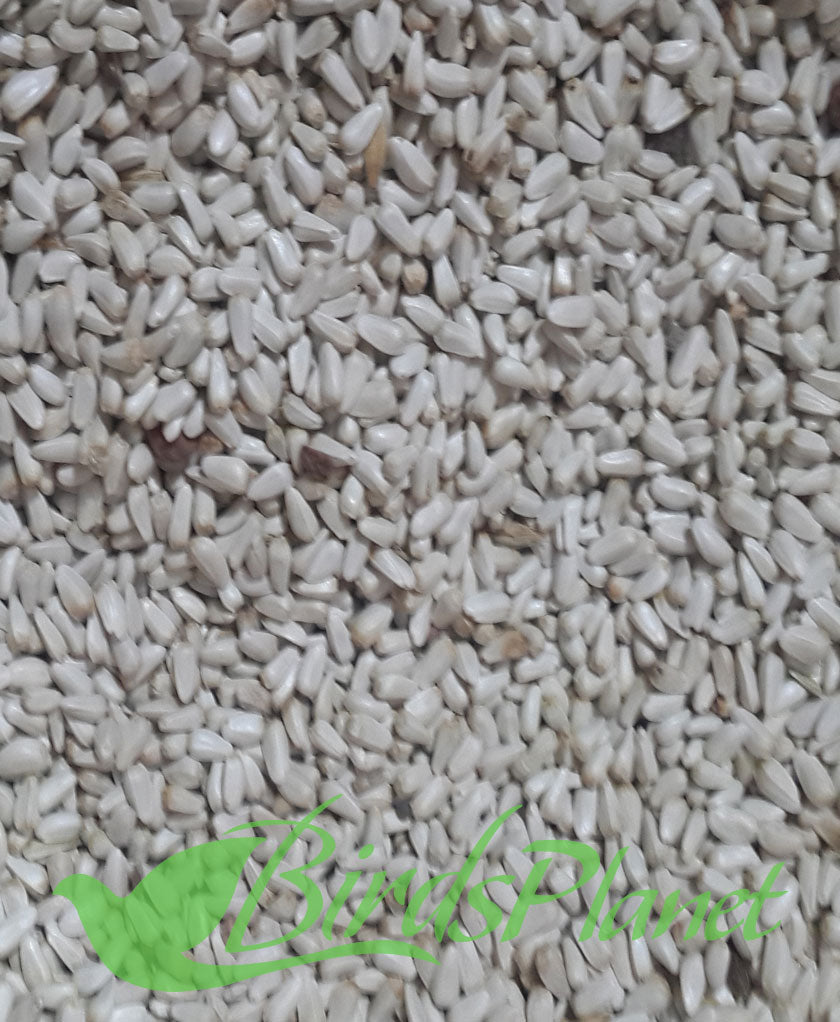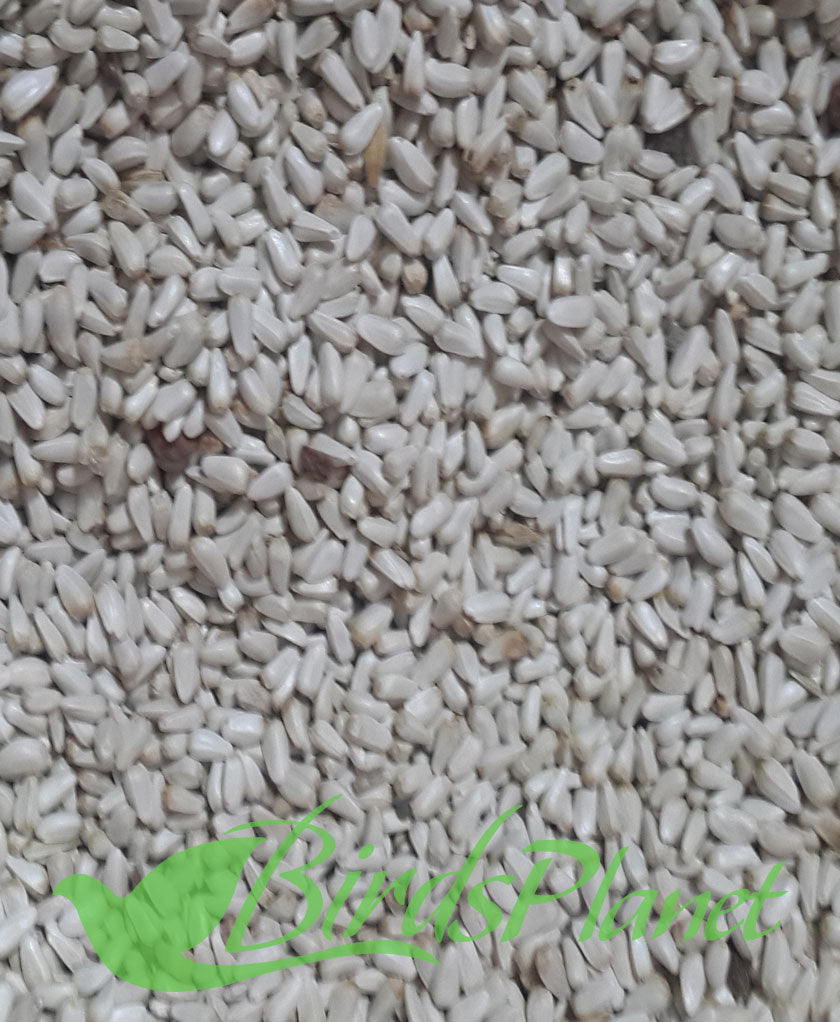Birds Planet
Kurtam - Safflower Seed کرتم سیڈ
Kurtam - Safflower Seed کرتم سیڈ
Couldn't load pickup availability
Kurtam / Safflower Seed کرتم سیڈ
Price for 1kg
Safflower seeds are a useful but relatively uncommon type of birdseed, but because of their great nutrition and which birds eat them, they are gradually growing in popularity among backyard birders. Learning more about safflower seeds can help backyard birders decide whether this seed would make a good addition to their feeding stations and how they can best incorporate it into their feeding menu.
Safflower seeds are the seeds of the annual safflower plant, Carthamus tinctorius. With its beautiful red, yellow and orange blooms, safflowers can be an attractive addition to gardens, but the thistle-like shape and scraggly foliage of the plant can put off gardeners who prefer more groomed flowers in their landscaping. The seeds, however, are ideal for birds, and safflower is cultivated as a crop in many areas, including the United States, Canada, India, Mexico, Ethiopia, China, Argentina and Kazakhstan.
Safflowers require arid climates with seasonal rainfall, and most safflower crops are grown for the oil of the seeds and the dyes of the plant. Birdseed cultivation is growing, however, as more backyard birders discover the value and usefulness of this seed.
As a type of birdseed, safflower seeds are slightly smaller than black oil sunflower seeds but similar in their tapered shape. They are white seeds and are high in protein, fat and fiber that can provide superior nutrition to many different backyard birds.
Birds That Eat Safflower Seeds
While safflower may not be the first seed choice for backyard birds accustomed to more familiar fare, once the seed is introduced, they can grow fond of it. Bird species that regularly feed on safflower seeds include:
Black-capped chickadees
Black-headed grosbeaks
Blue jays
Carolina chickadees
Downy woodpeckers
Evening grosbeaks
House finches
Mourning doves
Northern cardinals
Purple finches
Red-bellied woodpeckers
Rose-breasted grosbeaks
Tufted titmice
White-breasted nuthatches
Other bird species may also sample safflower seeds if they are made available, but the best feature of these seeds is not the birds that eat them, but the birds that won't. Safflower seeds have a bitter flavor and a different shape than other types of birdseed, and grackles, blackbirds and European starlings will typically leave these seeds alone, making them an ideal addition to feeding stations where these "bully birds" might dominate feeders. Many squirrels will also avoid safflower seed and will not disturb feeders where safflower is offered, though chipmunks have been known to prefer the seed and feeder baffles are still a wise precaution to prevent pests from taking advantage of the feeders.
How to Feed Safflower Seeds
Because many birds that prefer safflower are larger species that require adequate perching space, safflower seeds are best offered in large hopper, tube or platform feeders. Any feeder that can accommodate whole sunflower seeds will also be suitable for offering safflower seeds. Tossing some of the seed on the ground near shrubby, sheltered areas can also be a good way to provide it to ground-feeding birds such as doves.
Because safflower seeds look and taste different than more familiar sunflower seeds, birds may take some time to get used to this new food offering. Mixing small amounts of safflower seed into a birdseed mix or with black oil sunflower seeds can tempt birds to try the new seed, and the proportion of safflower to sunflower can gradually be changed as they accept the new food. At first, however, backyard birders should be prepared for some seed spillage as birds sort through mixes to get to the most familiar seeds, but removing alternative foods can encourage birds to try something new.
Where to Buy Safflower Seeds
Safflower seeds are not generally available in small bird feeding sections in grocery stores or other large retailers, but pet stores and wild bird stores will stock this more unique food. Online birdseed retailers also offer safflower, often at bulk discount rates that are more affordable than buying the seed from limited facilities. If straight safflower seeds are not available, it can often be found in "cardinal blend" mixes that will contain a greater proportion of safflower seed than other mixes. High quality birdseed blends will also usually contain some amount of safflower, though cheaper, less varied mixes are unlikely to have any of this seed included.
It is also possible to grow safflowers as part of a birdseed garden, and allowing these seed-bearing flowers to go to seed naturally will provide a ready source of food for foraging birds. Plant safflowers in a sunny, well-drained area and only use minimal water, as they thrive best in arid climates and dry conditions. These are annual flowers but allowing the seed heads to remain on the stalks can permit some seeds to fall and naturally reseed the area for the next year's growth.
Nutritious and popular, safflower seeds are a great option for many backyard birds while their unusual shape and bitter taste can discourage less welcome birds and squirrels. This makes them a beneficial addition to many backyard bird feeding stations, and the birds are always grateful for a new and tasty treat.
Share

Collapsible content
Shop from our Physical Store
BirdsPlanet (Pet store)
16-C, Abul Hassan Isfahani Road, Near Mobilink Franchise, Faisal Town Lahore.
Call/ Whatsapp 03351419323, 03008874039, 03111222845
Landline: 042-35160016
Our Timing
Monday to Saturday: 10am to 9pm
Share information about your brand with your customers. Describe a product, make announcements, or welcome customers to your store.

